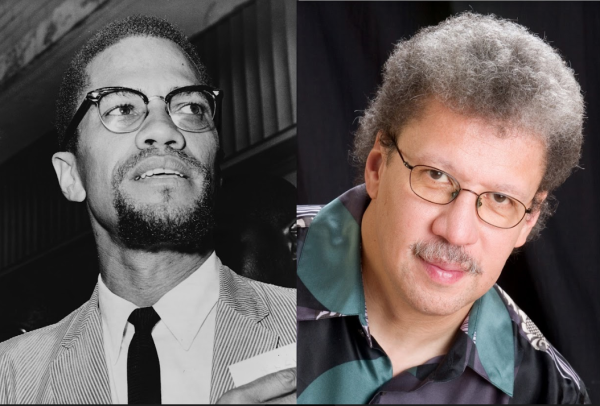October 28, 2021

Left: Malcolm X. Right: Composer Anthony Davis. Photos courtesy BMOP.
A new Boston-based theatre collaborative is aimimg to raise the curtain on Black-themed operas and elevate Black composers, starting with a new production at the Strand Theatre next June. The opera, based on the life of Malcolm X, will be the first in a five-year-long series planned by the Boston Modern Orchestra Project (BMOP) and Odyssey Opera.
The series is entitled “As Told By: History, Race, and Justice on the Opera Stage."
The goal of the series launch “is to seed the ground so that the history and the realization of Black composers in the opera house is expanded and can take on new life,” said Gil Rose, founder and artistic director of BMOP and Odyssey Opera.
Taken as a whole, the operas’ subject matter will trace the history of liberation in America and the rise of prominent leaders in civil rights activism, a listing that includes Harriet Tubman, Frederick Douglass, Rev. Martin Luther King, Jr., Malcolm X and Jean-Jacques Dessalines, a hero of the Haitian Revolution.
“These operas all have great, fertile soil for connecting with people, exploring different aspects of the principal characters, and their relationships to Boston,” Rose said.
Each opera selected has a tie-in to Boston. Malcolm X spent his teenage years living in Roxbury, not far from the Strand’s location in Uphams Corner. Rose considers the opera based on his life — “X: The Life and Times of Malcolm X” — to be “the great American opera.”
A later production, “The Bridge,” which is now being composed by Jonathan Bailey Holland, will detail how Martin Luther King Jr.’s time spent in Boston shaped his beliefs around civil rights. When King came to Boston in 1951, he studied philosophy and ethics at Boston University and eventually met his wife Coretta Scott here. This will be Howard’s first time composing a complete opera.
“I wanted the opportunity to take on this iconic figure but to shine the light on the moments that led up to him becoming who we know him as,” Holland said.
The title references the Edmund Pettus Bridge, where in the spring of 1965, King, John Lewis, and other civil rights protestors marching for voting rights were met with tear gas and beaten back by law enforcement officers. The title also encases a metaphor: the bridge that connects past, present, and future fights for civil rights.
The project, Rose said, has been in the works for nearly a decade. “I know that this is not a project that is trying to capitalize on the moment, but rather something that Gil has actually committed to artistically,” Howard said.
Rose started to stitch the pieces of the project together after exploring William Grant Still’s opera “Troubled Island”—a work set in Haiti in 1791 when Haitians revolted against white slavers and eventually defeated two French armies to secure their independence.
“Troubed Island” debuted at the New York City Opera House in 1949. It was the first opera written by a Black composer to be performed by a major opera company in the US. But it vanished from the opera scene shortly after its initial run and has not been performed in its entirety since.
In addition to the performances themselves, the project will be developing educational materials to accompany each production, said Ashleigh Gordon, the artistic and executive director of Castle of Our Skins, a Boston-based, Black-led chamber music ensemble.
Gordon’s group, for example, will work with students at the Boston Arts Academy to create music and performances inspired by the story of Malcolm X’s life.
Historically, Black opera has been overshadowed by “European stories and powdered wigs,” Gordon said. But as the project’s educational materials are developed and dispersed, Gordon said, she hopes that the students involved in the programs will be inspired by the historical figures’ legacies.
“If we can embolden them to find connections and hope, then I feel that much more confident about the world of tomorrow and tomorrow’s leaders,” she added.
An advisory council made up of 16 members of Black communities across Boston will also offer input on the project as it develops over the five-year period.
“Classical music has been behind the curve compared to other art forms—visual arts, theater, almost all in fact,” Rose said. “Classical music is sort of bringing up the rear, and I hope that this project can help in its own small way to accelerate that process forward.”
BMOP Announces As Told By: History, Race, and Justice on the Opera Stage from Chuck Furlong on Vimeo.



